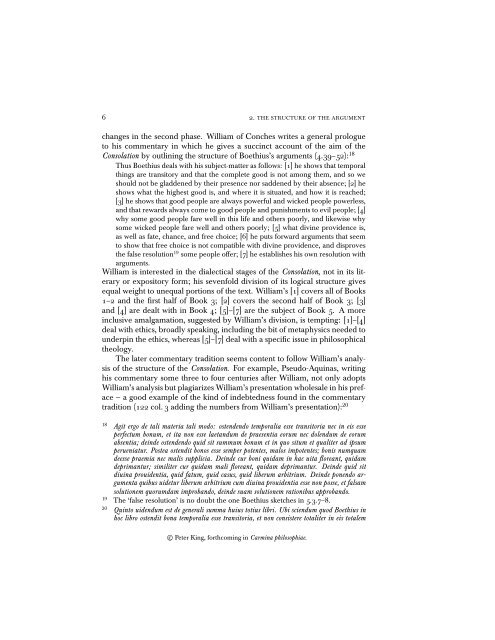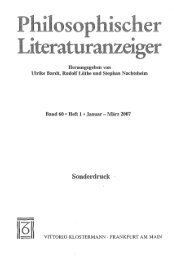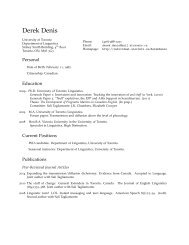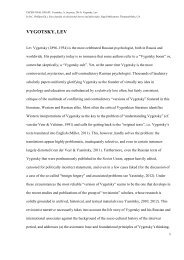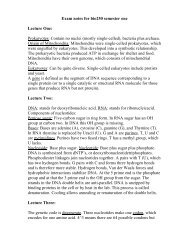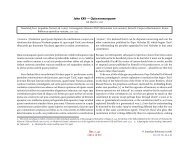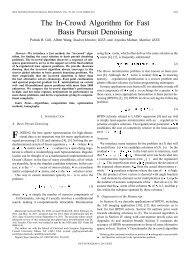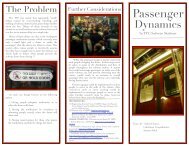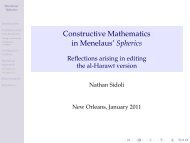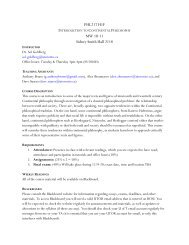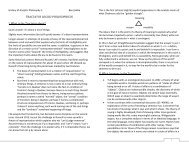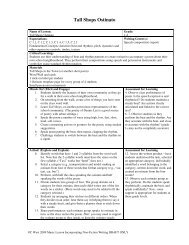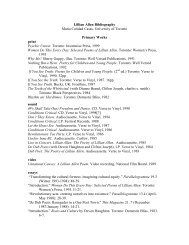BOETHIUS: FIRST OF THE SCHOLASTICS* - University of Toronto
BOETHIUS: FIRST OF THE SCHOLASTICS* - University of Toronto
BOETHIUS: FIRST OF THE SCHOLASTICS* - University of Toronto
You also want an ePaper? Increase the reach of your titles
YUMPU automatically turns print PDFs into web optimized ePapers that Google loves.
6 2. <strong>THE</strong> STRUCTURE <strong>OF</strong> <strong>THE</strong> ARGUMENT<br />
changes in the second phase. William <strong>of</strong> Conches writes a general prologue<br />
to his commentary in which he gives a succinct account <strong>of</strong> the aim <strong>of</strong> the<br />
Consolation by outlining the structure <strong>of</strong> Boethius’s arguments (4.39–52): 18<br />
ThusBoethiusdealswithhissubject-matterasfollows: [1]heshowsthattemporal<br />
things are transitory and that the complete good is not among them, and so we<br />
should not be gladdened by their presence nor saddened by their absence; [2] he<br />
shows what the highest good is, and where it is situated, and how it is reached;<br />
[3] he shows that good people are always powerful and wicked people powerless,<br />
andthatrewardsalwayscometogoodpeopleandpunishmentstoevilpeople;[4]<br />
why some good people fare well in this life and others poorly, and likewise why<br />
some wicked people fare well and others poorly; [5] what divine providence is,<br />
as well as fate, chance, and free choice; [6] he puts forward arguments that seem<br />
to show that free choice is not compatible with divine providence, and disproves<br />
the false resolution 19 some people <strong>of</strong>fer; [7]he establisheshis ownresolution with<br />
arguments.<br />
William is interested in the dialectical stages <strong>of</strong> the Consolation, not in its literary<br />
or expository form; his sevenfold division <strong>of</strong> its logical structure gives<br />
equal weight to unequal portions <strong>of</strong> the text. William’s [1] covers all <strong>of</strong> Books<br />
1–2 and the first half <strong>of</strong> Book 3; [2] covers the second half <strong>of</strong> Book 3; [3]<br />
and [4] are dealt with in Book 4; [5]–[7] are the subject <strong>of</strong> Book 5. A more<br />
inclusive amalgamation, suggested by William’s division, is tempting: [1]–[4]<br />
dealwithethics,broadlyspeaking,includingthebit<strong>of</strong>metaphysicsneededto<br />
underpin theethics, whereas[5]–[7]dealwith aspecificissueinphilosophical<br />
theology.<br />
The later commentary tradition seems content to follow William’s analysis<br />
<strong>of</strong> the structure <strong>of</strong> the Consolation. For example, Pseudo-Aquinas, writing<br />
his commentary some three to four centuries after William, not only adopts<br />
William’sanalysisbutplagiarizesWilliam’spresentationwholesaleinhispreface<br />
— a good example <strong>of</strong> the kind <strong>of</strong> indebtedness found in the commentary<br />
tradition (122 col.3 adding the numbers from William’s presentation): 20<br />
18 Agit ergo de tali materia tali modo: ostendendo temporalia esse transitoria nec in eis esse<br />
perfectum bonum, et ita non esse laetandum de praesentia eorum nec dolendum de eorum<br />
absentia; deinde ostendendo quid sit summum bonum et in quo situm et qualiter ad ipsum<br />
perueniatur. Postea ostendit bonos esse semper potentes, malos impotentes; bonis numquam<br />
deesse praemia nec malis supplicia. Deinde cur boni quidam in hac uita floreant, quidam<br />
deprimantur; similiter cur quidam mali floreant, quidam deprimantur. Deinde quid sit<br />
diuina prouidentia, quid fatum, quid casus, quid liberum arbitrium. Deinde ponendo argumenta<br />
quibusuideturliberum arbitrium cum diuina prouidentia esse non posse, et falsam<br />
solutionem quorumdam improbando, deinde suam solutionem rationibusapprobando.<br />
19 The ‘false resolution’ is no doubt the one Boethius sketches in 5.3.7–8.<br />
20 Quinto uidendum est de generali summa huius totius libri. Ubi sciendum quod Boethius in<br />
hoc libro ostendit bona temporalia esse transitoria, et non consistere totaliter in eis totalem<br />
c○ Peter King, forthcoming in Carmina philosophiae.


